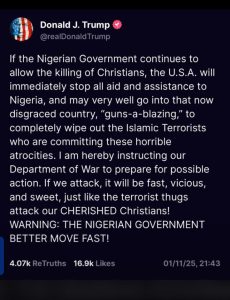By Ayo Kehinde

Tensions between Nigeria and Washington escalated sharply on Saturday, after U.S. President, Donald Trump, issued a blunt warning, vowing to halt American aid and consider military action if authorities fail to stop the killing of Christians in the country.
In a post on his Truth social media platform, Trump directed the Department of Defence (DOD) to “prepare for possible action” if the Nigerian government fails to curtail the situation. He accused the government of failing to protect Christian communities and suggested that the United States would “go in guns-a-blazing” if necessary.
“If the Nigerian Government continues to allow the killing of Christians, the U.S.A. will immediately stop all aid and assistance to Nigeria, and may very well go into that now disgraced country, ‘guns-a-blazing’, to completely wipe out the Islamic Terrorists who are committing these horrible atrocities.
“I am hereby instructing our Department of War to prepare for possible action”, the post continued. “If we attack, it will be fast, vicious, and sweet, just like the terrorist thugs attack our CHERISHED Christians! WARNING: THE NIGERIAN GOVERNMENT BETTER MOVE FAST!”, Trump wrote.
Responding to Trump’s directive, US Defence Secretary, Pete Hegseth, in a post on X, said, “The killing of innocent Christians in Nigeria — and anywhere — must end immediately. The Department of War is preparing for action. Either the Nigerian Government protects Christians, or we will kill the Islamic Terrorists who are committing these horrible atrocities.”
Trump had on Friday designated Nigeria as a “Country of Particular Concern” over alleged religious-freedom violations.
Nigeria’s government, however, rejected the characterisation and insisted that the nation remains committed to protecting all citizens.
In a reaction issued shortly after Trump’s comments, the Federal Government said the remarks “do not reflect the reality on the ground” and warned against politicising Nigeria’s internal security struggles.
Senior administration officials in Abuja emphasised that violence in Nigeria is complex and driven by criminal, ethnic, land-use, and extremist factors, not simply religious hostility. They stressed that security forces are already stretched confronting insurgency in the northeast, banditry in the northwest, and communal clashes across the Middle Belt.
Amid the uproar, faith-based groups in Nigeria responded cautiously. Christian leaders welcomed international concern but urged restraint in rhetoric, warning that external threats could inflame tensions. Muslim leaders condemned Trump’s remarks as “reckless” and called for peaceful coexistence.
In Washington, Trump’s allies praised the President’s tough stance, insisting that the United States must defend global religious freedom. Critics, however, accused the administration of jeopardising diplomatic stability and oversimplifying Nigeria’s security challenges for political effect.
International human-rights groups say thousands have died in religiously-tinged violence across Nigeria over the years, though they emphasise that victims cut across faiths. They also warn that political framing of the crisis risks fuelling further division and reprisals.
This US threat is coming at a time of ported a deadly attack on Farin Dutse, a Christian community in Kauru Local Government Area of Kaduna State, by armed bandits, who shot dead Rev. Kambasaya of the United Church of Christ in Nigeria (UCCN) and abducted more than 20 residents, including women and children, on Tuesday.
In June, more than twenty people were reported killed in Plateau State following an attack on the hometown of a Catholic bishop, days after the cleric testified before the U.S. Congress on the persecution of Christians in Nigeria.
Global Christian advocacy group, Open Doors, recently estimated that nearly 70% of all Christians killed worldwide for their faith last year were Nigerian, warning that the country remains the most dangerous place in the world to be a Christian.
International rights organisations also estimate that thousands of Christians are killed annually in Nigeria, with many communities displaced in Plateau, Benue, Kaduna, Niger and parts of Taraba States.
But President Tinubu stated on Saturday that “Nigeria stands firmly as a democracy governed by constitutional guarantees of religious liberty. Since 2023, our administration has maintained an open and active engagement with Christian and Muslim leaders alike and continues to address security challenges which affect citizens across faiths and regions.”
Tinubu insisted that “the characterisation of Nigeria as religiously intolerant does not reflect our national reality, nor does it take into consideration the consistent and sincere efforts of the government to safeguard freedom of religion and beliefs for all Nigerians. Religious freedom and tolerance have been a core tenet of our collective identity and shall always remain so. Nigeria opposes religious persecution and does not encourage it.”
He assured that “Nigeria is a country with constitutional guarantees to protect citizens of all faiths. Our administration is committed to working with the United States government and the international community to deepen understanding and cooperation on the protection of communities of all faiths.”



